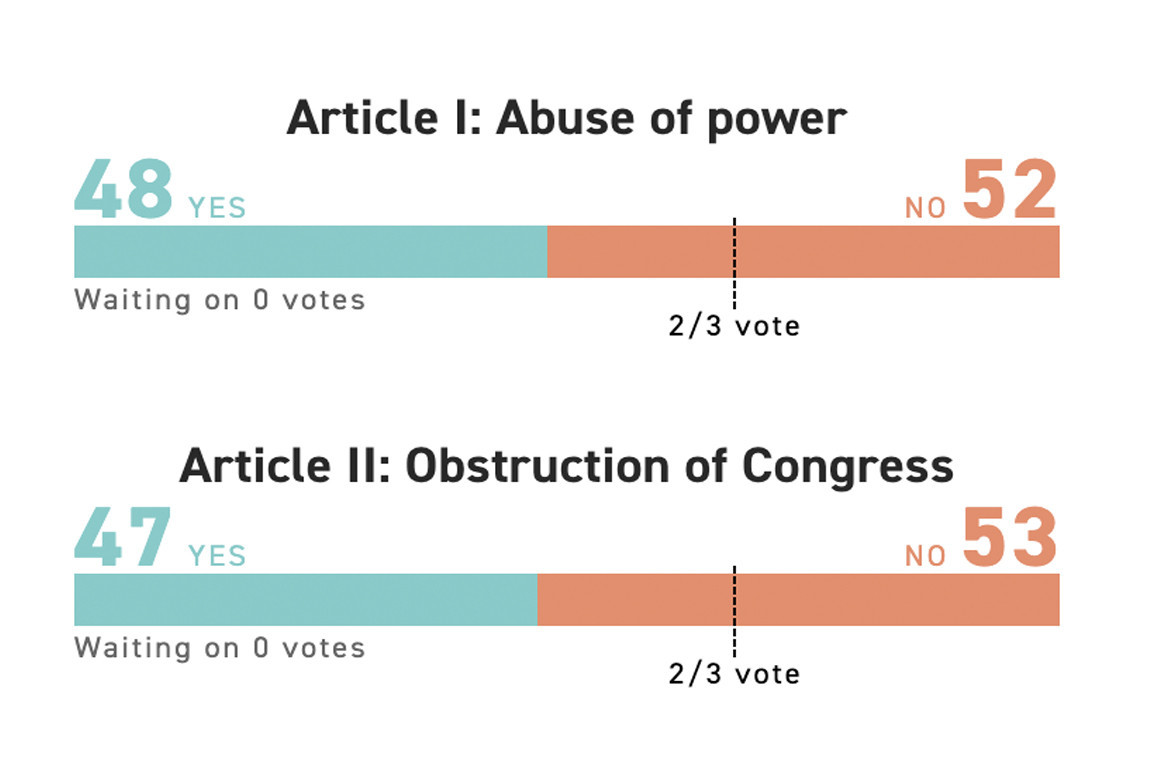Trump acquitted on impeachment charges, ending gravest threat to his presidency
After five months of hearings, investigations and revelations about President Trump’s dealings with Ukraine, a divided United States Senate acquitted him on Wednesday Jan 5th 2020 of charges that he abused his power and obstructed Congress to aid his own re-election, bringing an acrimonious impeachment trial to its expected end.
In a pair of votes whose outcome was never in doubt, the Senate fell well short of the two-thirds margin that would have been needed to remove the 45th president. The verdicts came down — after three weeks of debate — almost entirely along party lines, with every Democrat voting “guilty” on both charges and Republicans uniformly voting “not guilty” on the obstruction of Congress charge.
Only one Republican, Senator Mitt Romney of Utah, broke with his party to judge Mr. Trump guilty of abuse of power.

It was the third impeachment trial of a president and the third acquittal in American history, and it ended the way it began: with Republicans and Democrats at odds. They disagreed over Mr. Trump’s conduct and his fitness for office, even as some members of his own party conceded the basic allegations that undergirded the charges, that he sought to pressure Ukraine to smear his political rivals.
But in a sign of the widening partisan divide testing the country and its institutions, the verdict did not promise finality, which members of both parties conceded would come only after the November election.
The president himself did not directly address his acquittal, but shortly afterward, he announced on Twitter that he would make a public statement on Thursday at the White House about what he called “our Country’s VICTORY on the Impeachment Hoax.” He then tweeted an attack ad against Mr. Romney that called the senator a “Democrat secret asset.”
“It is, therefore, ordered and adjudged that the said Donald John Trump be, and he is hereby, acquitted of the charges in said articles,” declared Chief Justice Roberts after the second article was defeated.
Democratic leaders immediately insisted the result was illegitimate, the product of a self-interested cover-up by Republicans, and promised to continue their investigations of Mr. Trump.
“The verdict of this kangaroo court will be meaningless,” Senator Chuck Schumer of New York, the Democratic leader, said moments before the vote. “By refusing the facts — by refusing witnesses and documents — the Republican majority has placed a giant asterisk, the asterisk of a sham trial, next to the acquittal of President Trump, written in permanent ink.”
“It is, therefore, ordered and adjudged that the said Donald John Trump be, and he is hereby, acquitted of the charges in said articles,” declared Chief Justice Roberts after the second article was defeated.
“This decision has been made,” Mr. McConnell said curtly. “As far as I’m concerned, it’s in the rearview mirror.”
As expected, the tally in favor of conviction on each article fell far below the 67-vote threshold necessary for removal. The first charge was abuse of power, accusing Mr. Trump of a scheme to use the levers of government to coerce Ukraine to do his political bidding. It did not even garner a majority vote, failing 48 to 52, with Mr. Romney voting with the Democrats. The second article, charging Mr. Trump with obstruction of Congress for an across-the-board blockade of House subpoenas and oversight requests, failed 47 to 53, strictly on party lines.
Like this one, the trials of Presidents Andrew Johnson and Bill Clinton also ended in acquittal — a reflection of the Constitution’s high burden for removing a chief executive.
But in a stinging rebuke of the country’s leader aimed at history, Mr. Romney, the 2012 Republican presidential nominee, said that Mr. Trump’s pressure campaign on Ukraine was “the most abusive and destructive violation of one’s oath of office that I can imagine.” Though he voted against the second article, Mr. Romney became emotional on the Senate floor in the hours before the verdict on Wednesday as he described why he deemed Mr. Trump guilty of abuse of power, calling it a matter of conscience. He was the first senator ever to vote to remove a president of his own party.
Impeachment was seriously contemplated for a president only once in the first two centuries of the American republic; it now has been so three times since the 1970s, and two of the past four presidents have been impeached.
